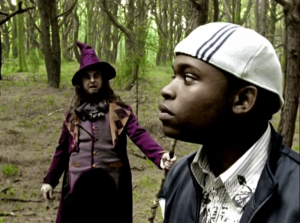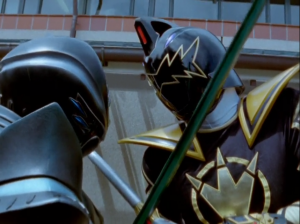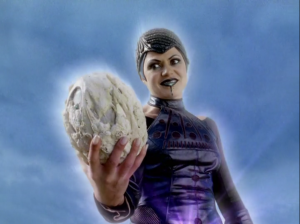A cross between our TV Flashback series and Power Rangers coverage, we’ll be looking back week-to-week at past Power Rangers seasons, beginning to end, to coincide with breaks during and between the current seasons.
Episodes 6-7, “Diva in Distress” & “Game On”
Originally aired: March 13 & 20, 2004
 Modeling a character as an archetype is part of the nature of writing. It’s especially important when it comes to a show like Power Rangers, which derives all its non-action material on the diversity of its ensemble. The key to making it a solid background for a character, and not simply a flat stereotype, is not getting too hung up on the wrong details. For example, Conner as a jock works when showcasing loyalty to the sports team vs. loyalty to the superhero team, but wouldn’t work if it had nothing to do with the character outside of having him yell sports puns all the time. It’s a fine line to tread between background and stereotype when it comes to kids’ shows, where the characterization can’t always be as nuanced as we might like, and Power Rangers has failed about as much as its succeeded in a lot of ways.
Modeling a character as an archetype is part of the nature of writing. It’s especially important when it comes to a show like Power Rangers, which derives all its non-action material on the diversity of its ensemble. The key to making it a solid background for a character, and not simply a flat stereotype, is not getting too hung up on the wrong details. For example, Conner as a jock works when showcasing loyalty to the sports team vs. loyalty to the superhero team, but wouldn’t work if it had nothing to do with the character outside of having him yell sports puns all the time. It’s a fine line to tread between background and stereotype when it comes to kids’ shows, where the characterization can’t always be as nuanced as we might like, and Power Rangers has failed about as much as its succeeded in a lot of ways.
This is clear in comparing “Diva in Distress” to “Game On” — the first spotlight episodes for Kira and Ethan, respectively. Both use Kira’s music and Ethan’s video games, the primary signifiers of what types of characters they are, to tell stories about them. Neither are particularly memorable, but the former is by and far the better of the two. The strength of “Diva in Distress” lies in how focused it is, at least compared to its successor. That might sound weird to say, of course; it’s an episode about Kira, but crafts an arc about a pop star parody, plus includes subplots with Cassidy and Devin and introduces the oft-mentioned Anton Mercer. Coupled with the monster-of-the-week and expected Zord battle, that’s a lot to cram into a single 22 minute episode. But it all ties together exceptionally well, for the most part, with the purely comedic Cassidy/Devin bits being the only outliers.
Kira and Kylie’s clash and eventual reconciliation is in stark contrast with Mercer and Oliver’s; the former exposes old wounds as a way to fix their problem and heal Kira’s own self-doubt, while the latter leaves the pot untouched and lets it silently sizzle. Kylie benefits from the age-sapping ray (with age make-up that isn’t actually that bad) because it strips away what turned her down a self-destructive path. It forces her to reflect on her life in a way neither Mercer nor Oliver have been forced to do. Kylie’s revelation then grants Kira the karmic gift she’s deserved for being about the only one of this bunch to have integrity. Remember, Kira was only got detention in the first episode because she broke the rules by accident; as important as arcs for characters are, sometimes it’s worth exploring who they already are, and in her case she’s a purely decent human being, Avril-wannabe or not. And of course, none of these things would have happened without the pomegranate-shooting donkey monster that can extract the youth out of people (“That’s so wrong in so many ways.”) It’s a careful placement of falling dominoes, and it uses a silly monster to reveal truths about the characters — or in the case of Anton Mercer, play against how damaging a lack of truth can be.
 “Game On,” conversely, is all over the place. The only reason this is an Ethan episode is because it has to do with video games, and even then…there isn’t much of a plot, really. There are things that work; that Dr. Oliver has to convince these kids to train, when in his days he and his friends trained for fun, fits into this season’s goal of contrasting the show now with the show of yesteryear. And there is some nice focus Ethan’s obsessiveness. The problem is that the episode doesn’t really hinge on it; after all, considering how so many characters get sucked into the game just by walking by, the plan would have worked whether or not Ethan couldn’t get away. Just have the computer suck people in while the cafe is open, and things might have worked even better for the bad guys. And more importantly, pointing out Ethan’s flaw doesn’t really achieve anything. Sure, Kira’s spotlight didn’t necessarily change her, but the focus on her integrity by way of a foil paints her as a more interesting character. It doesn’t need resolution beyond giving her some closure. Ethan, on the other hand, is shown to have a very clear and important flaw, but it’s one that isn’t done much with beyond acknowledging that it’s a flaw that exists.
“Game On,” conversely, is all over the place. The only reason this is an Ethan episode is because it has to do with video games, and even then…there isn’t much of a plot, really. There are things that work; that Dr. Oliver has to convince these kids to train, when in his days he and his friends trained for fun, fits into this season’s goal of contrasting the show now with the show of yesteryear. And there is some nice focus Ethan’s obsessiveness. The problem is that the episode doesn’t really hinge on it; after all, considering how so many characters get sucked into the game just by walking by, the plan would have worked whether or not Ethan couldn’t get away. Just have the computer suck people in while the cafe is open, and things might have worked even better for the bad guys. And more importantly, pointing out Ethan’s flaw doesn’t really achieve anything. Sure, Kira’s spotlight didn’t necessarily change her, but the focus on her integrity by way of a foil paints her as a more interesting character. It doesn’t need resolution beyond giving her some closure. Ethan, on the other hand, is shown to have a very clear and important flaw, but it’s one that isn’t done much with beyond acknowledging that it’s a flaw that exists.
Had a fun plot been wrapped around exploring the repercussions of Ethan’s obsessiveness and shirking of responsibility, it might have been forgiveable. But things are so all-over the place — first it’s about Ethan getting trapped, then it’s about everyone getting trapped, then it’s about returning the wizard Beldorf to the game, then it’s a Zord battle like usual. The Beldorf escape seems like it would go somewhere, but aside from a creepy/funny bit with erasing Dr. Oliver’s mouth, he’s incredibly pointless…which is frustrating, because he could have been lots of fun. Throw in bits like Kira and Ethan nonsensically showing up late riding the Ptera Zord, Tommy trying to jump-kick a fully grown monster, and Cassidy running around as Gwynivere because we needed a weird medieval reference for a fantasy game backdrop, and this whole episode is just a mess. The one upside is that the lesson ender thankfully isn’t as trite as “video games are bad,” and is rightfully focused on reasonably splitting up your time between fun and responsibility. But man, is it a slog to get through up until that point, made even worse for being sandwiched between two of the more solid installments.
Episodes 8-9, “Golden Boy” & “Beneath the Surface”
Originally aired: March 27 & April 3, 2004
 One of Dino Thunder‘s best attributes is its ability to aptly develop a whole slew of characters, Rangers or not. It’s far cry from seasons that have had trouble developing its own core team, as “Golden Boy” and “Beneath the Surface” each take steps to develop Trent, Anton Mercer, and even Zeltrax and Elsa to an extent.
One of Dino Thunder‘s best attributes is its ability to aptly develop a whole slew of characters, Rangers or not. It’s far cry from seasons that have had trouble developing its own core team, as “Golden Boy” and “Beneath the Surface” each take steps to develop Trent, Anton Mercer, and even Zeltrax and Elsa to an extent.
Forgetting what we know of Trent and Anton’s significance (though it’s blatantly obvious where they’ll each probably end up), these are only supporting characters at this stage, tied into the backstory but with unclear roles in the present. “Golden Boy” and “Beneath the Surface” both do stellar work with this twisted relationship, especially in that it both lives up to and subsequently subverts expectations.
On one hand, Anton Mercer is Lionel Luthor/Norman Osborn type, a manipulative, power-hungry businessman. But unlike his predecessors in the archetype, Mercer deeply cares for Trent. We discover that he heroically adopted him by his own accord after the death of his parents, and all of his devious moves are in his son’s best interests, twisted as they may be. There’s a part of Mercer’s nasty gameplays that you have to respect; the fact that cares about his son above all else and is willing to direct his power into Trent’s success is admirable. It only falls apart because he tries to screw everyone else over to do it. Mercer honestly doesn’t see the fault in firing and buying out Hayley and Cyberspace, not because he’s eeeeevil, but because in the end, it benefits his son. It’s a surprisingly complex type of relationship for Power Rangers, perhaps even moreso than the noteworthy father/son relationship in Time Force.
“Golden Boy” is much better at exploring it, because much like “Diva in Distress,” it cleverly plays the fantasy story as a foil to the character story. Zeltrax is the other character in the spotlight, as the constant failure to kill his self-proclaimed nemesis, Dr. Oliver, ends up randomly creating a “son.” The pseudo-cloning process is totally out of nowhere, but it works; Zeltrax maybe has a smidgen of care for his protege, but his goal of defeating Oliver is far more important. Both Mercer and Zeltrax are clear antagonists, but their intentions are what separate them. At this point in the show, Zeltrax’s mysterious rivalry is already getting a bit grating, only helped because Tommy’s reactions are always a hilariously frustrated “I have no idea what you’re talking about!” But it works here, because it very clearly paints why Zeltrax fails as a father figure while Mercer, as bad of a guy as he is, still succeeds.
There’s lots more to the story, of course, but “Golden Boy” and the Mercer/Trent bits of “Beneath the Surface” solidify this weighty father-son relationship as a major part of the storyline. Even moreso when Trent discovers his father uses Mesagog’s Invisiportal transport and confronts him about it in “Beneath the Surface.” The progression of his story is a great example of one that feels slow burn, but manages to accomplish quite a lot with every step.
 “Beneath the Surface” doesn’t fare as well as “Golden Boy,” though, as the A-Plot is one of the weirdest and more convoluted plots of the season. The Rangers find an egg that Elsa apparently knew about, but she somehow needed them to find it first so she could swap it out with a fake egg, and then the Zord in that egg just happens to have the power to beat the monster that also gets released…? It doesn’t matter in the end, since it just leads to another Zord — a Dimetro zord — and another weird sequence of taming the maybe-sentient Dinos. The confusing nature of the bio-tech powers is still the biggest detriment to the show at this point (though troubles with adapting the Sentai material is nothing new).
“Beneath the Surface” doesn’t fare as well as “Golden Boy,” though, as the A-Plot is one of the weirdest and more convoluted plots of the season. The Rangers find an egg that Elsa apparently knew about, but she somehow needed them to find it first so she could swap it out with a fake egg, and then the Zord in that egg just happens to have the power to beat the monster that also gets released…? It doesn’t matter in the end, since it just leads to another Zord — a Dimetro zord — and another weird sequence of taming the maybe-sentient Dinos. The confusing nature of the bio-tech powers is still the biggest detriment to the show at this point (though troubles with adapting the Sentai material is nothing new).
But it’s not as confusing as the apparent romance awkwardly teased between Dr. Oliver and Principal Randall. It’s kind of fun, but it’s also hard to tell if we’re meant to take them seriously or not. It’s nice to give the “old” members of the cast something more to do, but at this point, nothing has indicated that Elsa and her alter-ego have any good in them whatsoever (nor do we even really know who or what she is.) The title of the episode suggests this is supposed to be about both the egg and Elsa being “beneath the surface,” and maybe romantic feelings are also “beneath the surface” — a type of thematic tying I’d appreciate — but it just doesn’t play that way. It’s not a bad development, just a weird one that seems thrown in out of nowhere.
But even though “Beneath the Surface” is a weaker installment as a whole, the throughline of this season is continuing to be much more interesting and complex than the “Tommy is back with dinosaurs” conceit suggested. Pieces set up at the beginning are moving, and characters that seem to have no place in a Power Rangers story are making their mark.
Odds & Ends
- This week in dated 2004 pop culture references: You Request It in lieu of Total Request Live, and Ethan calls Conner and Kira “David Beckham and…” well…Kira doesn’t want us to say it.
- In the first of many changes to the opening credits, we now have Tommy bumped up to be listed as the Black Ranger and Trent included. I feel bad that Jeffrey Parazzo’s clip has him looking like such a goober.
- Really dig the smartly shot opening of “Diva in Distress,” with all the distractions from Kira’s performance.
- The acting is weirdly off in the Kira/Conner scene from “Diva in Distress,” during their “You’re so”/”I’m what? I’m what? Nevermind” exchange.
- Trent is absolutely adorable in these episodes, and I’d forgotten how Jeffrey Parazzo portrayed him so awkward and introverted. Case and point: all of his cute interactions with Kira, and the fact that he tries to draw her…but can only draw superheroes.
- Cassidy is a terrible person in all these episodes, but she’s exceptionally funny in “Diva in Distress.” Particulary her interviewing the monster (“When did you know when you were evil?”) and “It’s hard enough being a woman in this profession, now I have to fight ageism too!”
- The song Kira and Kylie sing is surprisingly good for being a Power Rangers song, cleverly making a break-up song with lyrics that are easily reinterpreted to being about long lost friends.
- Much as “Game On” was kind of a drag, there are some notable bits of Dino Thunder cleverness hidden within. I really like that the monster is smart enough to hit Conner mid-morph and stop him from powering up, and when the Rangers and mooks escape the game, there’s a quick pause of “Huh? Whatever” before they continue fighting that’s seriously funny. The fact that there’s a fight like that in an indoor cafe is creative.
- Evidence that “Golden Boy” would be a good episode right from the top: it opens with a random Zord battle.
- The freeze frame when Dr. Oliver catches Principal Randall in “Beneath the Surface” is weird, but the fight sequence where he battles the mooks while tossing her around is awesome. But then his awkward “Yeah alright!” dance at the end of the episode in his lair goes back to being weird.
- More Cassidy goodness: “It’s like he’s never heard of the great depression. Well I’m super depressed!”
- “I must look at least…40!”
- “Oh man, my insurance company’s never gonna buy this”
- “I’ve known my dad long enough to know he doesn’t make mistakes.”
“I’ve know him long enough to know he does.” - “Heard you guys were here to fight city hall.”
“I guess they meant fight in front of it?” - “It’s attacking Little Tokyo!” – Whatever you say, Conner.

